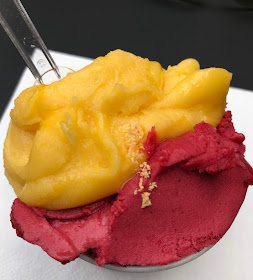Or rather not through Catalonia, but into it, because even when you get over the border to France, you’re still in a bit of Catalonia, north of the Pyrenees. Even the French refer to the region as ‘le pays Catalan’ (note that the expression is in French, not Catalan).
Separatist feeling is nothing like as strong as on the Spanish side of the mountains. You hear far less Catalan being spoken on the streets. But there is still a strong attachment to the region’s Catalan roots. Town and street names often appear in Catalan as well as French, and the Catalan flag – gold and red bars – proudly flies everywhere.
 |
| The flag of Catalonia flying from a small surviving part of the battlements of Perpignan (French) or Perpinyà (Catalan) |
 |
| An excellent ice and in the appropriate colours for Catalonia |
‘I’d like a crêpe,’ I announced.
Crêpes are sold in crêperies. They’re usually Breton and offer both savoury and sweet pancakes, and they can often be delicious. Sometimes not so much. But I’m forever hopeful. They usually sell wines and beers but the drink of choice to wash the crêpes down is Norman or Breton cider, served in pitchers and drunk out of vessels that look like nothing so much as tea cups, even down to the handles.
It was a shock when we got to the village where we were spending the night, just on the edge of the Pyrenees. There were far fewer restaurants than we’d confidently expected, and most of them were closed. With autumn on us and shorter days, we soon found ourselves wandering dark and gloomy streets in, even at 9:00 at night, in an apparently hopeless quest for somewhere that would serve us food.
It was beginning to seem to me that we would just have to come to terms with not finding anywhere open. We’d have to settle for a night without a meal. Given my weight, that might well be a lot better for my body, but it would be a lot less fun for my soul.
Danielle hadn’t yet accepted the grim truth that weren’t going to find anywhere. She was leading the way confidently ever upwards through the village streets, into the top levels where the streets were all streets and it was perfectly obvious we’d find no restaurants.
And then we came around a corner and saw light flooding out onto the pavement. A pool of good cheer. And – it was coming from a crêperie. We received a new burst of energy and new strength to our legs, as we made at speed towards the vision of delight, even though the street became even steeper for our last few steps.
It was not just a crêperie, but a genuinely Breton one. With a real Breton as owner and chef. It was open, we weren’t too late to order, and it let us in with the dogs. We had an excellent savoury crêpe each followed by one with caramelised apple, drowned in calvados and flambéd.
On the wall alongside us was a large Breton flag. But, to my amusement, next to it was a Catalan one. I remarked on the fact to the proprietor.
 |
| Breton (left) and Catalan flags |
French Catalonia is about as far southwards from Brittany as you can get without leaving France. But Danielle is from Alsace, which is as far eastwards as you can get without landing up in Germany. But she’s always been struck by the number of Breton-Alsatian couples she knows.
She told the proprietor. ‘It seems that whenever a Breton meets an Alsatian, they both say, “what a shame that France comes between us.”’
France of course would deny that vile allegation. The nation brings these disparate regions together, its leaders would claim, it doesn’t separate them. A great notion, though somewhat belied by the staunch spirit of independence expressed in so lively a way by regions such as Alsace, Brittany or Catalonia.
Symbolised by the two fine flags we could admire while enjoying the excellent crêpes Danielle’s persistence had earned for us.
No comments:
Post a Comment